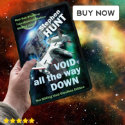A | B | C | D | E | F | G | H | I | J | K | L | M | N | O | P | Q | R | S | T | U | V | W | X | Y | Z
Anderson, Poul (Poul Anderson)
Once upon a time in the realm of fantasy and science fiction, there emerged a storyteller whose words bewitched readers with tales spun across time, space, and alternate realities. His name was Poul Anderson, an American author who wove stories from the mid-20th century right into the dawn of the 21st. His arsenal wasn't limited to otherworldly narratives alone; he also ventured into historical novels with the deftness of a seasoned time traveler.
Regarded as the best storyteller in science fiction, according to Algis Budrys in 1965, Anderson was known for his captivating narratives. He had a knack for blending the realm of the fantastical with the scientific, creating stories that were as mesmerizing as a star-filled sky. His literary brilliance was acknowledged with seven Hugo Awards and three Nebula Awards, placing him amongst the most celebrated sci-fi writers.
One of Anderson's most notable works is "The Broken Sword," a fantasy novel published in 1954, which wove a tale as enchanting as any spoken around a campfire. This, along with many other works, fortified his reputation as a maestro of the genre.
Anderson was not just a writer; he was also a builder of communities. He co-founded the Society for Creative Anachronism (SCA) in 1966, an organization devoted to studying and recreating medieval European cultures and their histories. He was also part of the Swordsmen and Sorcerers' Guild of America (SAGA), a collective of heroic fantasy authors organized by Lin Carter.
His influence on the genre didn't go unnoticed by his peers. Robert A. Heinlein dedicated his 1985 novel "The Cat Who Walks Through Walls" to Anderson and others who formed part of the Citizens' Advisory Council on National Space Policy. The Science Fiction Writers of America recognized Anderson as its 16th SFWA Grand Master in 1998, cementing his position as a legend of the genre.
Anderson's imagination knew no bounds. From his History of Rustum series, which explored societal struggles in distant planets, to the Time Patrol series that danced with the concept of time travel, each book was a testament to his boundless creativity. His Harvest of Stars series questioned the power of artificial intelligence, while his Terran Empire series took readers on a thrilling journey across interstellar politics and warfare.
But Anderson's quill was stilled on July 31, 2001, when he passed away from prostate cancer. Yet, even death couldn't stop his stories. Posthumously, his tales continued to fill the bookshelves, offering solace to those who missed his ingenious storytelling. You can search the Nest for articles on Anderson, Poul (Poul Anderson) over at https://www.SFcrowsnest.info/tag/Poul-Anderson



